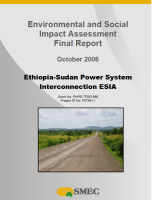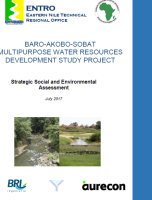Abstract
Report of the Environmental and Social Impact Assessment (ESIA) for the Ethiopia-Sudan Power System Interconnection Project, which aimed to: (1) identify potential negative and positive environmental impacts of the different alternatives considered; (2) provide technical information and recommendations to help select and design the best alternative; and (3) prepare an environmental management plan (with a mitigation program, monitoring plan, program of technical assistance; and institutional arrangements for the preferred route). Prepared in accordance with the requirements of the Governments of Ethiopia and the Sudan, and World Bank policies and procedures, this ESIA Report (i) describes the proposed project work (the transmission line and the new Gedaraef substation), operation and maintenance, area of impact, project implementation and cost; (ii) provides baseline data on physical, biological and socio-cultural environments, and economic activities; (iii) gives account on environmental impacts (public consultation held, different types of impacts considered, and their mitigation measures); (iv) presents the analysis of alternatives conducted; and (v) presents the environmental management plan for the preferred route, including management measures for pre-, during- and post-construction phases; institutional arrangements and strengthening; training; and monitoring. It concludes that, based on detailed field work for the preferred route, secondary data sources and consultations with Project affected people, local, regional and national government agencies and other organizations, it is unlikely that the Project will have significant adverse social and environmental impacts. The most adverse impacts are of a temporary nature during the construction phase and can be managed to acceptable levels by implementing recommended mitigation measures in the Environmental Management Plan for the Project such that the overall benefits from the Project will greatly outweigh the adverse impacts.

